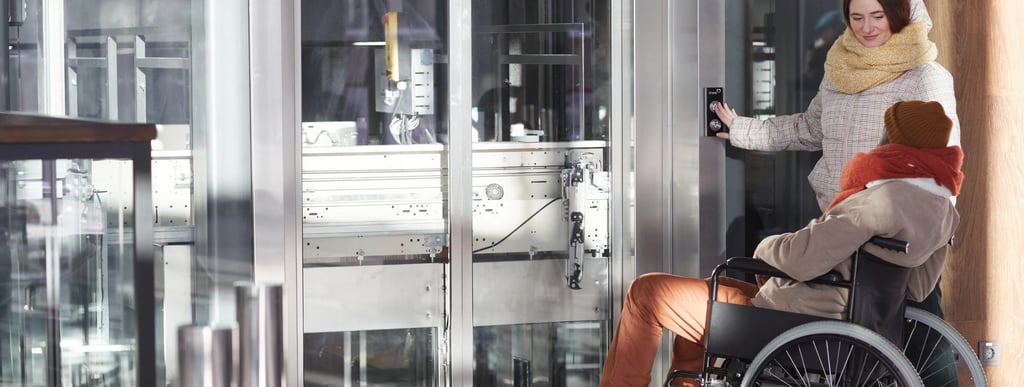Beyond Ramps: Rethinking Accessibility in Everyday Life
Accessibility goes far beyond physical ramps—it’s about dignity, autonomy, and real inclusion. This blog explores the daily challenges faced by people with disabilities and offers practical, person-centered ways to foster a truly inclusive world. At Scarroz Studio Design, we believe accessibility is a right, not a privilege.
Scarlett Rozario
5/5/20243 min read


Many people with special needs or disabilities face daily encounters with stereotypes—harmful, reductive ideas that box people into narrow roles. One damaging stereotype is treating adults with disabilities, particularly those who are non-verbal or have intellectual disabilities, like children. Despite being full-grown adults with dreams, preferences, and rights, they are often spoken to in a patronizing tone, denied adult opportunities, and left out of critical conversations about their own lives. This infantilization is not just insulting; it actively limits opportunities. It prevents adults from managing their own money, participating in adult relationships, pursuing careers, or setting personal goals.
As a society, we must do better.
How We as a Society Can Support Them?
Support and inclusion mean meeting people where they are and helping them set meaningful goals—just like anyone else. Ways we can support individuals with special needs include:
Set annual personal goals: Help individuals articulate and work toward their dreams, whether that’s something simple like opening their own bank account, learning to cook independently, or something more complex like pursuing higher education or launching a small business.
Respect autonomy: Always assume competence. Give people choices, honor their decisions, and avoid speaking over them.
Provide adaptive tools: Whether it’s communication devices, sensory supports, or accessibility apps, ensure people have the right tools to succeed.
Offer adult opportunities: Encourage participation in adult education, career development, relationship-building, and leadership roles.
Foster community connections: Create spaces where people with disabilities are part of the broader social fabric—not isolated or segregated. Support isn’t about "helping" from a place of pity; it’s about opening doors, removing obstacles, and walking alongside someone as they define and pursue their own version of success.
Daily Challenges Faced by Persons with Special Needs.
Living with special needs involves a constant navigation of a world not designed for you. These are just a few examples:
Physical barriers: Inaccessible buildings, uneven sidewalks, public transport limitations.
Sensory overload: Bright lights, loud sounds, crowded places can cause distress.
Communication breakdowns: Lack of patience or tools for non-verbal individuals.
Social isolation: Misunderstandings, stigma, and lack of inclusive spaces lead to loneliness.
Limited access to specialized support: Therapists, special educators, adaptive tools, and inclusive schools are often scarce or expensive.
Support and accommodation is not a privilege, a right. Providing support isn’t about charity; it’s about justice. Everyone deserves the tools and environment they need to thrive. Accommodations might include:
Creating personalized schedules and visual cues.
Offering noise-canceling headphones or quiet zones.
Training staff, educators, and caregivers on inclusive practices.
Making mental health care and therapy part of routine care. Support should be proactive and person-centered. Ask: What does this person need to feel safe, comfortable, and empowered?
Inclusion in the Community: Belonging and Participation.
Accessibility must go hand in hand with inclusion. People with special needs should be active, valued members of our communities—not segregated or sidelined. They should be encouraged and supported to attend schools, colleges, and workplaces with full participation ; Join community events, clubs, and gatherings without fear of exclusion ; Engage in recreation, sports, and arts in a way that respects their needs and talents ; Contribute their voices and perspectives in decision-making spaces. Everyone deserves to belong. Inclusion isn't about inviting someone to the table—it’s about redesigning the table so everyone fits comfortably.
How to Be an Ally or Advocate Ally-ship starts with listening and learning.
Here are a few ways to advocate for accessible living:
Speak up when you see inaccessibility.
Educate yourself on neurodivergence and disabilities.
Include disabled voices in planning, design, and policy.
Use inclusive language and avoid assumptions.
Support businesses and creators who prioritize accessibility.
Accessibility is everyone's responsibility. It benefits all of us in different ways—from curb cuts to captions, inclusive design helps more people than we realize.
Where Do We Go From Here?
We need to move from performative inclusivity to meaningful change. That means examining our systems, our spaces, and ourselves. Are we making it easier or harder for people to exist fully and safely? At Scarroz Studio Design, we believe in accessible living that is thoughtful, beautiful, and empowering. Our products are designed to support real needs—from sensory-friendly clothing to visual aids, caregiver tools, and more. But beyond products, we’re here to build a community that honours and uplifts every experience.
Let’s go beyond ramps. Let’s build a world that welcomes everyone, just as they are.

Stay Connected
Follow us for new drops, stories, and designs that speak to you.
Join the Scarroz Circle
© 2025. All rights reserved.
Get first access to new collections, exclusive offers, and updates that celebrate individuality.
